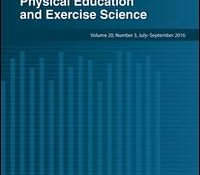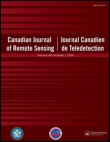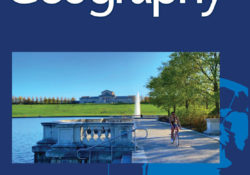tandfonline.com har udgivet en rapport under søgningen “Teacher Education Mathematics”: Post-educational motivation to learn cognitive skills in three European labour markets. A comparative analysis of the PIAAC Link til kilde
Like this:
Like Loading...
tandfonline.com har udgivet en rapport under søgningen “Teacher Education Mathematics”: ABSTRACT ABSTRACT Formation of professional identity is a process where individuals attempt to bring together the social expectations set for them as professionals and their own interests and values. The cultural landscape of engineering is masculine in various ways, which can be challenging especially for female engineers who need to match the cultural expectations with their personal identities. So far, few studies have compared the professional identities of early-career men and women engineers. This study aims to understand the professional identities of newly graduated Finnish male and female engineers by analysing their perceptions of the importance and development of professional engineering skills. An analysis of cross-sectional survey data of more than 4000 early-career engineers suggests some gender differences related to… Continue Reading →
Like this:
Like Loading...
tandfonline.com har udgivet en rapport under søgningen “Teacher Education Mathematics”: Educating the Next Generation of Remote Sensing Specialists: Skills and Industry Needs in a Changing World Link til kilde
Like this:
Like Loading...

tandfonline.com har udgivet en rapport under søgningen “Teacher Education Mathematics”: ABSTRACT ABSTRACT Evidence suggests that children struggle to acquire age-appropriate fundamental movement skills (FMS), despite their importance for facilitating physical activity. This has led to calls for routine school-based screening of children’s FMS. However, there is limited research exploring schools’ capacity to conduct such assessments. This study investigated what factors might affect the adoption and implementation of FMS assessments in primary schools. School staff (n = 853) completed an online questionnaire developed using the Capability, Opportunity, Motivation and Behavior (COM-B) model. A majority reported that knowledge of pupils’ FMS ability would be beneficial (65.3%), and 71.8% would assess FMS if support was provided. Barriers included: Capability – few possessed knowledge of FMS (15%); Opportunity – teachers reported 30–60 minutes as acceptable for assessing… Continue Reading →
Like this:
Like Loading...
eric.ed.gov har udgivet: This Child Development Associate (CDA) training module is intended to teach CDA interns how to provide classroom experiences that promote basic mathematics skills in preschool children. Knowledge of relationships of objects in space, grouping of objects, teaching of number names and counting, and the use of math games are discussed. The trainee is encouraged to learn how to plan and develop lessons, games, activities and environmental conditions to teach about objects and their location in space. Both teacher and trainee materials are provided in the module. Teacher materials consist of directions for pre-testing and field supervision, a resource person activity list and directions for each student activity. Trainee materials include pre- and post-tests, an activity record, a glossary, directions and 17 lessons. (Author/RH) Link til kilde
Like this:
Like Loading...
eric.ed.gov har udgivet: Background: Financial accounting is a skills course which to a large extent can be best learned through deliberate practice. Teachers implement this by continuously assigning homeworks, encouraging good study habits, asking students to budget time for studying, and generally exhorting students to “work hard”. Aims: This paper examines the impact of “study habits, skills, and attitudes” (SHSAs) on the performance of students in an introductory financial accounting college course. Sample: 395 2nd year business students in a Philippine university. Method: Data related to variables found to have influenced accounting performance in previous researches as well as SHSA variables are collected through student survey and school records. They are treated as independent variables using multiple regression analysis, with the accounting course final grade as the dependent variable. The… Continue Reading →
Like this:
Like Loading...
eric.ed.gov har udgivet: The Partnership for 21st Century Skills (P21) has forged alliances with key national organizations representing the core academic subjects, including Social Studies, English, Math, Science, Geography, World Languages and the Arts. These collaborations have resulted in the development of 21st Century Skills Maps that illustrate the essential intersection between core subjects and 21st Century Skills. The Partnership advocates for the integration of 21st Century Skills into K-12 education so that students can advance their learning in core academic subjects. Developed through a year-long collaborative process, this map reflects the collective effort of Mathematics professors, teachers and thought leaders, and illustrates the integration of Mathematics and 21st Century Skills. It will provide educators, administrators and policymakers with concrete examples of how 21st Century Skills can be integrated into… Continue Reading →
Like this:
Like Loading...
eric.ed.gov har udgivet: This teacher’s guide is intended for use in helping Kodak Corporation employees develop the basic mathematics skills required to perform the manufacturing and quality control tasks expected of them. The following topics are covered in the first five modules: the four basic functions (adding, subtracting, multiplying, and dividing), calculations involving decimals, percentages, positive and negative numbers, and fractions. The sixth module reviews the topics covered in the preceding modules and helps students transfer the mathematics skills presented to applications on the shop floor. Each module includes some or all of the following: the module goal, an introduction, materials and guidelines for direct instruction, activities for use in guided practice, materials for use in applied practice, activities to develop critical thinking strategies, and a pretest and posttest. Transparency… Continue Reading →
Like this:
Like Loading...
eric.ed.gov har udgivet: This report describes the federally funded development and field testing of a math drill and practice computer software program for students with mild disabilities. Program features include: pre-assessment of pupil speed and accuracy, automatic placement of the pupil in appropriate problems for practice, automatic monitoring of pupil performance, and automatic adjustment of practice problems. Field testing was undertaken with junior and senior high students with learning disabilities as well as with grade 4-5 students without disabilities. A user’s manual included with the report offers a quick reference to basic operations of the program, detailed information regarding each program component and associated decision-making algorithms, and a glossary of terms. A teacher’s handbook provides guidelines for applying drill and practice in special and remedial math instruction, explains the theoretical… Continue Reading →
Like this:
Like Loading...
tandfonline.com har udgivet en rapport under søgningen “Teacher Education Mathematics”: Abstract Abstract This paper centers on to evaluate whether and to what extent the learning objectives of the geography curricula emphasize students’ higher-order thinking skills (HOTS), and whether students are capable of answering to HOTS-questions by using the Finnish upper secondary geography education as an example. The revised Bloom’s taxonomy was used as a framework for the content analysis. The findings show that geography has the potential to enhance students’ HOTS, but students experience difficulties when answering to HOTS-questions. The results could be used to evaluate the desired thinking skills and knowledge dimensions in geography education for to enhance students meaningful learning. Link til kilde
Like this:
Like Loading...




